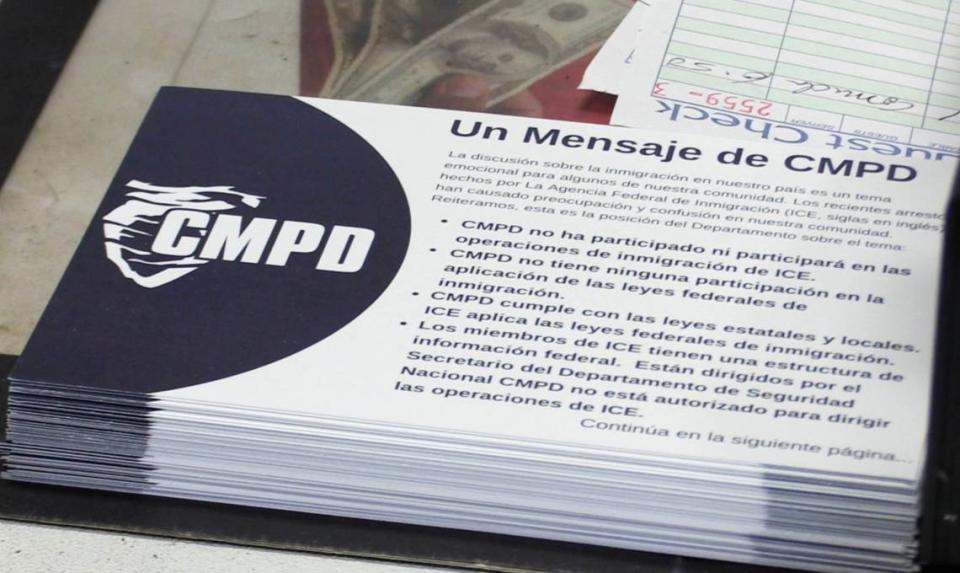CMPD says it will be easier for undocumented crime victims to be certified for U visas
Undocumented immigrants who are crime victims and cooperate with police may find it easier to receive certifications of U visas and gain legal residency.
The Charlotte-Mecklenburg Police Department has updated its U visa policy to include language that:
▪ Says CMPD will be more supportive of certifying U visas, even if crime victims are not necessarily needed for court or successful prosecution at the time the application is submitted.
▪ Limits a criminal record check on applicants to five years, and only offenses considered dangerous to the public would be potential disqualifiers — including multiple felonies, violent crimes, burglaries, domestic violence, resisting a public officer and dangerous driving offenses.
▪ Incorporates an updated 90-day appeal process for applicants.
The updated policy also helps undocumented immigrants who were crime victims obtain temporary lawful status for them and their family members for four years.
The Observer reported in April that undocumented immigrants have had a difficult time in recent years getting CMPD to certify their applications for U visas, which ultimately must be approved by the federal government. Police Chief Johnny Jennings promised to change that.
“It’s a huge change,” said Stefan R. Latorre, an immigration lawyer and founder of Latorre Law Firm. “I’m very thankful to Jennings and his team for making that change.”
‘Harsher than it needed to be’
CMPD has voluntarily been heading the U visa program since 2010, and since then, there have been three police chiefs who have been in charge of how it has operated. Latorre had meetings with the former chiefs about how to operate the program, but said Jennings genuinely understood the importance of the U visa when the two met in December 2020.
“He understood that it’s designed to help immigrants who are traditionally distrustful of police because in many of the foreign countries some police are corrupt,” Latorre said.
Enacted in 2000 by Congress, the U visa program is administered by U.S. Citizenship and Immigration Services. Reviews of new applications by the agency can take years.
The federal criteria for an undocumented immigrant to be eligible for a U visa includes they had to be a victim of a crime, and must cooperate with local law enforcement in investigating and prosecuting the crime.
In past years, CMPD had a number of additional requirements that undocumented immigrants must meet to receive certification from the department, including police making an arrest in the case they’re involved in and the applicants not having a criminal record.

“Maybe our interpretation of ‘useful for the prosecution of the case’ was a little bit harsher than it needed to be,” Jennings said in an interview in April.
The harsh requirements and added restrictions led to the total number of U visa certification requests dropping from 1,094 in 2015 to 308 in 2020.
CMPD’s updated policy comes after Jennings worked with District Attorney Spencer Merriweather, leaders in the Hispanic community and other stakeholders, said Robert Tufano, CMPD spokesman.
“Updating our U-Visa application process will allow us to cultivate an even stronger relationship with the community,” Tufano said.
U Visa applications are free of charge and can be found on CMPD’s website.
Seeking a uniform policy
Although Charlotte has made changes, Latorre said he’s worried about surrounding police departments following the old U visa policy that contained various restrictions, or didn’t offer certifications at all.
“Certifying law enforcement agencies always have discretion to complete a certification in support of a U visa, unless otherwise required by state law,” according to a USCIS spokeman.
Latorre said he hopes all police departments will some day operated under the same policy. Now, departments have different philosophies, which can be unfair to the immigrant who’s trying to cooperate with them and help the community at large.
“If you’re a victim of a very serious crime and you cooperate with authorities, in one place you can actually apply and get a U visa, which means it could help your whole family obtain legal residence,” Latorre said. “But in another place, you get nothing.”
Former staff writer Amanda Zhou contributed to this story.

 Yahoo Movies
Yahoo Movies 
